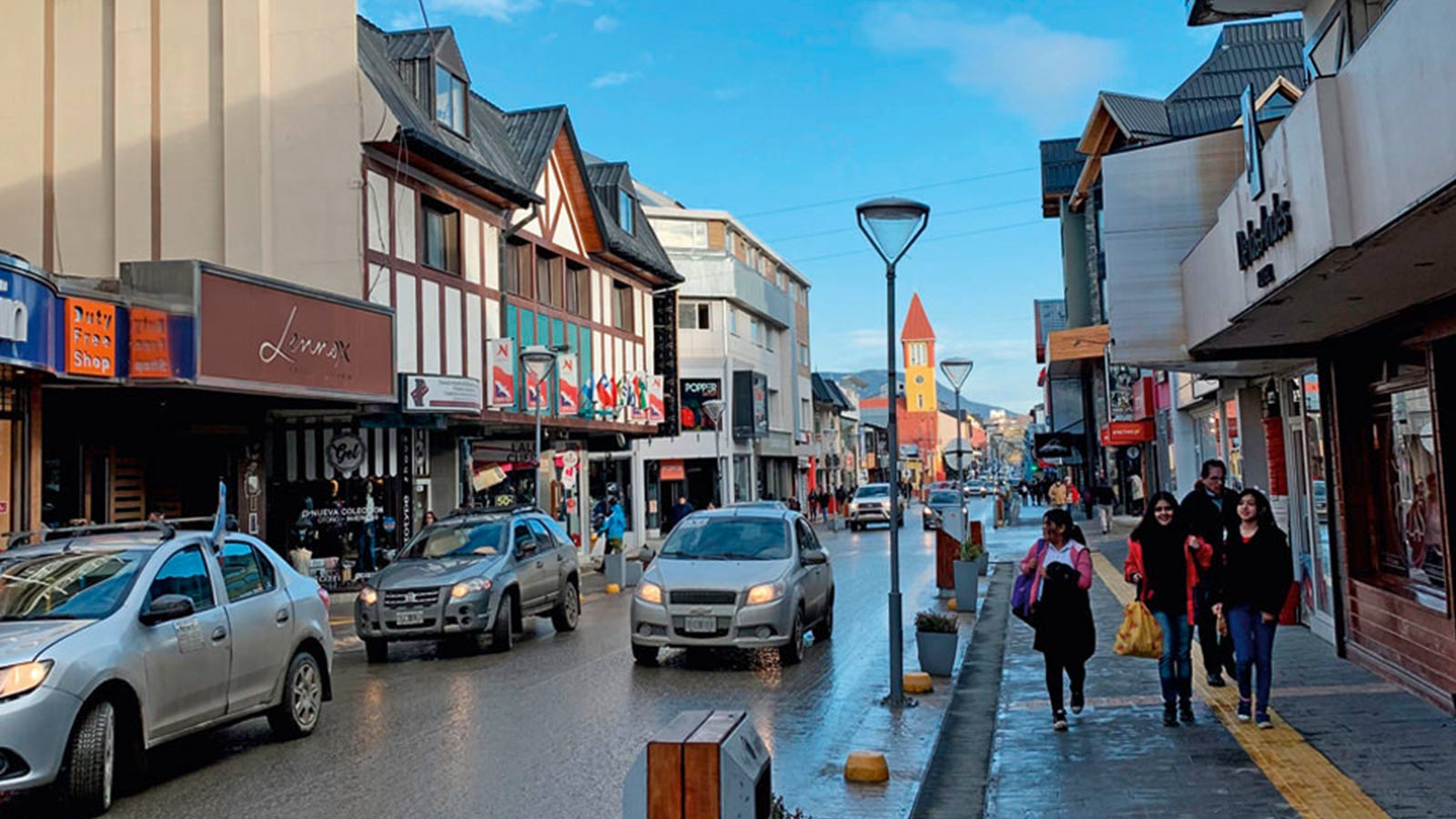Are you flying to Mallorca? Congratulations, you’ll be joining the five million Germans who visit the island every year. Perhaps our author Maximilian Reich would like that too, but instead we prefer to send him to places where no package tourists set foot. This month: Ushuaia.
“Are you sure?” “Absolutely!” says Lilli. My friend and I are standing in a shoe store in the center of Munich. In other words: it stands. I sit in front of her on a small bench and look skeptically at the pair of sneaker socks on my pale feet. “I just need new sneakers,” I say. “But you can’t wear tennis socks for that. That looks impossible in shorts.” I have long, thin legs that look like spaghetti with a hairy mold on them. I could wear wings on my feet like Hermes the messenger of the gods and still look like shit in shorts. “I feel like a stripper,” I say, looking down at my bare ankle. I have the feeling that everyone in the room is staring at my exposed body parts. I grumble at a little boy walking past me. “Hey, my eyes are up here!” Lilli blows a strand of hair out of her face. “My goodness, you really know how to dramatize. Can you please just take them now so we can get out of here?” “Whatever. But I need the shoes one size bigger. The…” My cell phone vibrates next to me on the bench and interrupts my sentence. My editor-in-chief calls. I switch on the loudspeaker so that I have my hands free to slip my tight shoes off again. “Max! Ushuaia – how does that sound to you?” the boss’s voice echoes through the shoe store. “Like the sushi I had for dinner last night.” Lilli rolls her eyes. “It’s a luxury hotel in Ibiza,” she whispers to me. “The best DJs in the world play in the associated beach club.” “Very funny,” says my boss. “I need you there for three days for a story.” Lilli stands next to me and nods her head like a wobbly dachshund on a mogul slope. “Only if my girlfriend is allowed to come with me,” I say and hand the too-small shoes to a sales clerk. “Fine by me,” says my boss. “But she has to pay for the flight herself.” I look at my wobbly friend, who is on the verge of whiplash. “All right. Just send me the ticket and the information,” I say and hang up. The seller is still in the warehouse looking for a pair in my size when the e-mail with the ticket arrives. I look at my display in horror. “Uh, honey? The flight goes to Ushuaia in Argentina.” “Oh, THE Ushuaia?!” “What? THE Ushuaia? Is there more than one?” “Well, a village in South America is probably called that too. Is somehow considered the end of the world or something?” I stare at her open-mouthed. “And that’s where we have to go now???” Lilli scratches her head. “Um, I just remembered that I have to prepare a presentation for work next week and I don’t have any time. Really stupid. Sorry.” As my ex-girlfriend and I leave the shoe store, I feel a breeze around my ankles. Somehow I have the feeling that I’ve made several wrong decisions today .
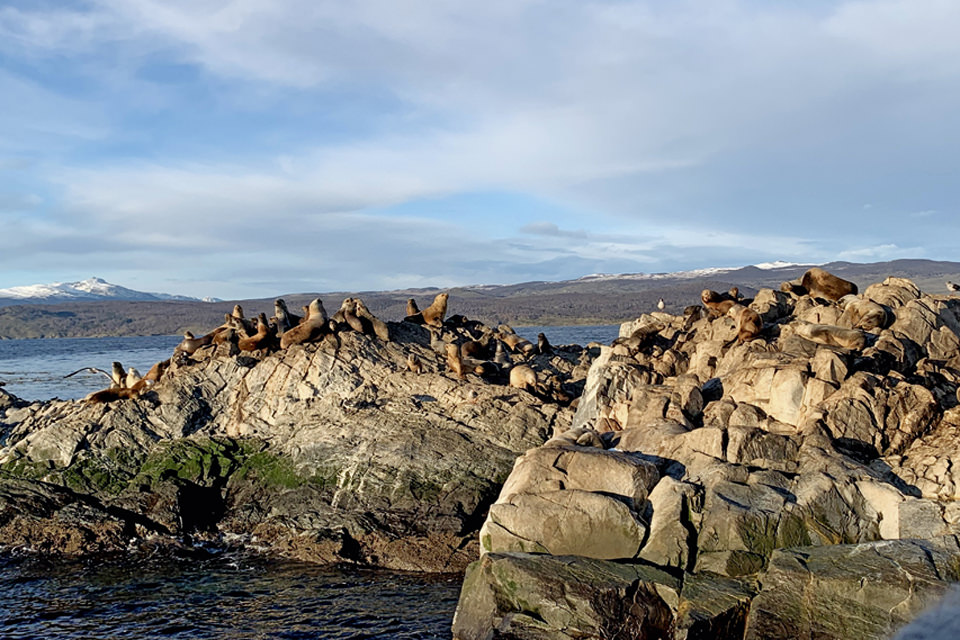
Heat collapse shortly before the South Pole
Ushuaia is located 3,500 kilometers from Antarctica, which is roughly the distance between London and Rome. The Argentinians have nicknamed it the “southernmost city in the world”, although this is something of an exaggeration. Puerto Williams in Chile, for example, is another 50 kilometers below this, but only 2,000 people live there, and it is therefore not a town, but a village. When South Americans want to, they can be very fussy. To get to Ushuaia, you can fly from Zurich to Buenos Aires with Edelweiss Air. Planes take off from there every day to take tourists to the end of the world in five hours. When I get into the machine, I’m wearing long thermal underpants, the thick woollen socks that my grandmother used to knit during dialysis, my old ’70s ski instructor’ turtleneck sweater and a thick winter jacket over it. It’s really cold at the South Pole, I thought. But I was wrong, as it turns out when I get off the plane. It’s about twelve degrees and the sweat is dripping from the tip of my nose. Just before the South Pole, I’m on the verge of heat exhaustion. I wish I’d worn my new ankle socks.
At the hotel reception desk, a young man sits on a chair and greets me with a friendly “Hola! Que tal?”
Spanish sounds cooler than German, I think as I slide my passport over the counter to him. That’s why the Terminator in the movie says “Hasta la vista” and not “Tschö mit ö.” Very few people in Argentina speak English. This makes it a little more difficult for tourists, but it is perfectly understandable. After all, the entire continent speaks the same language. So why bother with English vocabulary?
“Muy bien, gracias,” I reply – which is pretty much the only sentence I know in Spanish. Well, that and “Soy una chica transexual” because I was in Barcelona once and tried Tinder before I got together with Lilli.
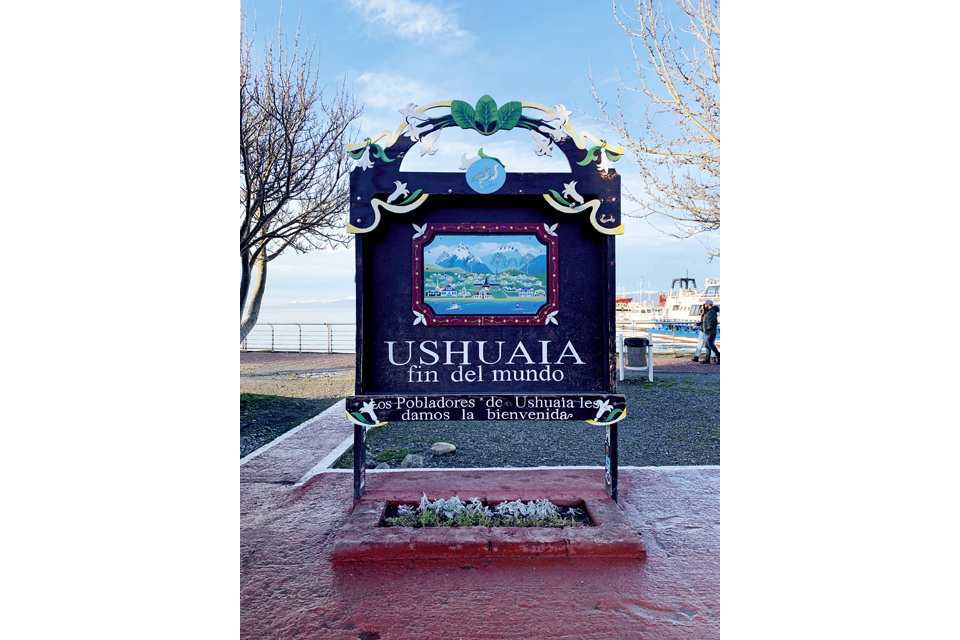
Sentimental at the end of the world
Ushuaia lies on a narrow strip on the slope of a mountain range that rises up around the bay like a bouncer in front of a pimply 16-year-old. The city looks similar: unattractive and inconspicuous. Single-storey houses without any special architectural features stand side by side in blocks. In the 19th century The area was settled by Indians in the 19th century before the British established a base here in 1869 and began bringing their prisoners here 40 years later. They built a prison and a railroad, and the city slowly began to grow. Today almost 60,000 locals live here, most of whom run a restaurant or sell winter clothing to tourists. There are two types of tourists that you can meet on on the streets of Ushuaia: Dentists who are amateur photographers in their spare time and who have 5,000 euros to spare for one of the Antarctic cruises departing from here – and poor students who have to take a photo of Ushuaia on Instagram from mainstream Bali travelers want to stand out. Most of them can be found grinning like honey cake horses after coitus with their thumbs up at the harbor in front of the wooden sign that reads: “Ushuaia, end of the world”. The harbor is the only beautiful place in this city anyway. Behind him in a semicircle are the massive glaciers with their white heads. Above it the sky and in front of you just the water, both so blue and radiant, as if God had drunkenly tinkered with the saturation in the filter. And somewhere behind it the South Pole. I am not really a sentimental person. Most of what I’ve seen in my life so far has left me rather cold. The waterfalls of Iguazu: nothing other than water splashing down from above. Hello? Have you ever turned on a tap? Northern lights in Norway: I can see sparkling lights in the dark every day if I squint hard enough. My best friend’s baby: Mei, just looks like any other baby, right? But the idea that the earth somehow ends here and that, after all my travels, I have now reached the end of the line in a way, moves me so deeply that I sit down on a park bench to enjoy the moment.
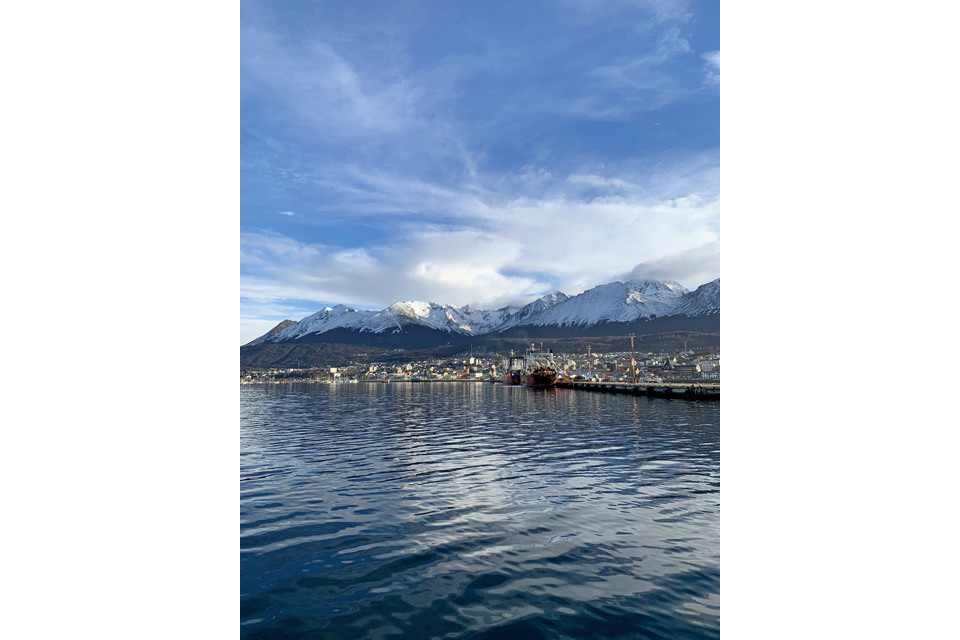
Journalist meeting
On the other hand, it’s just a port. So I continue my walk after five minutes. I pick up information about the southernmost national park in the world at a tour operator’s stand, walk past the southernmost hard rock café in the world and learn more about the southernmost railroad in the world at the local museum. You have to hand it to the Argentinians , they know how to market a unique selling point. In the evening, over a beer in a pub, which is of course the southernmost pub in the world, I meet a travel journalist from Rome who is also here to write an article about Ushuaia. He has shaggy hair, which has certainly never seen a comb before, and wears a down vest over his black sweater. Tomorrow he has an interview with the mayor.
“I want to talk to him about the economic upturn in the region,” he says.
“I see,” I say.
“And what are you researching for your Ushuaia story?”
“I’m going to see sea lions tomorrow,” I say.
“Ah, you’re writing about the effects of climate change on the area and pinning it on the local sea lions?”
“Huh? No, I just like sea lions. You can take a boat tour for 20 francs and go over to an island off the coast where they all live.”
“I see,” says the travel journalist and takes a sip of beer. “I spoke to one of the tour operators this morning. They also offer excursions to Isla Martillo, where you can observe Magellanic penguins. Interestingly, but only in summer. Who would have thought that penguins are summer animals? At first I thought he was trying to take the piss out of me.”
I shrug my shoulders. “No idea. I haven’t talked to anyone here.”
“No?”
“Nah…”
“What have you been doing all day? You have to write about something…”
“I was watching the toilet flush in the hotel earlier to see if the water flows the other way round here in the middle of nowhere.”
The travel journalist looks at me, stunned, as if I had placed a burning cowpat on the doorstep of Buckingham Palace. “So?” he finally asks.
I take a sip of beer. “I don’t know. I’ve forgotten which way it goes at home.”
The travel journalist scratches his beard. “Who are you writing for again?”
“FACES.”
“And they don’t give you a specific topic to research on site?”
“Nope. The editors just think about where I might find it really shitty – and then they send me there.”
“Strange,” mumbles the travel journalist and drains his beer.
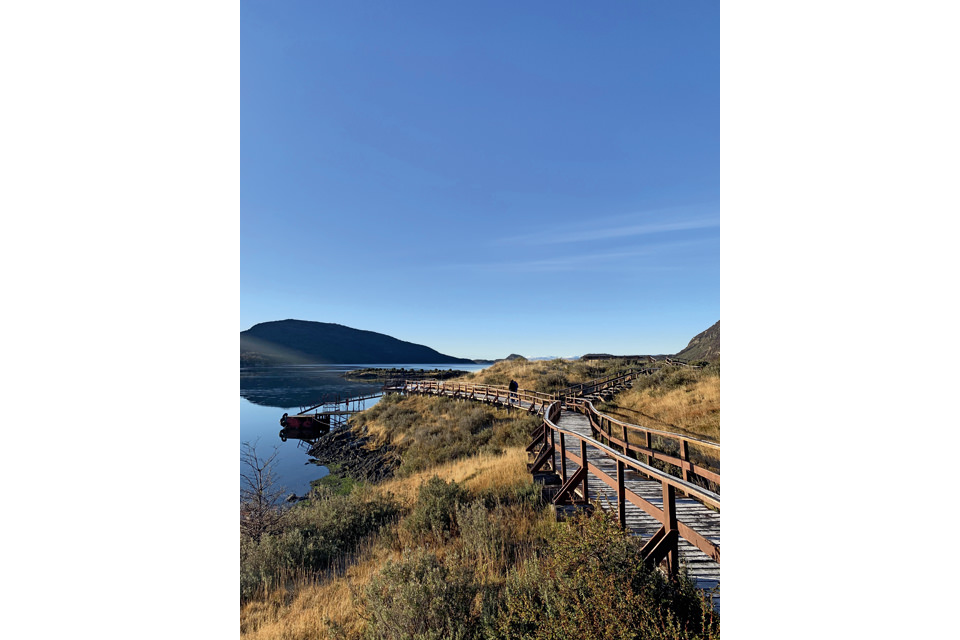
Muy importante
After our conversation, I feel guilty. Perhaps I should do a bit more research for my text, I think, and the next morning I take the bus to the nearby Tierra del Fuego National Park. After half an hour, the bus stops in a parking lot in front of the entrance to the national park. The bus driver stands in the middle of the aisle and says something in Spanish. His speech lasts about five minutes and contains the words “muy importante” several times, which he says with great emphasis. “Muy importante.” When he has finished his speech, I raise my hand. “Excuse me, could you repeat it for me in English?” The bus driver comes up to me in the back and says: “We’re there now. Meet back here at 3pm.” That’s all he says. Then he nods once and goes back to the front. I can’t shake off the feeling that he left a few things out in his translation. To be honest, the walk through the national park is not very different from the walks I used to take with my father through Oberstdorf. Narrow paths lead tourists through a forest and across a field past several small lakes. Afraid of getting lost and possibly missing the bus, I cling to a American retired couple. Pensioners are real pros at hiking because they have nothing else to do in life. They walk as far as the artificial hip will carry them. They never get lost. Except perhaps the moronic 90-year-old back when I was a civilian. She was only wearing a bra and had a pair of underpants on her head as she wandered through the adjacent park looking for her deceased Harald. I just hope that these seniors are still in their right minds. After a while the two suddenly stop. The man leans on his walking stick and moans: “My feet are killing me.”
“I told you to break in your shoes first, Bill.”
“It’s not that, Nancy. The shoe rubs against my ankle.”
The gentleman sits down on a stone and takes off his shoe. As I walk past, I dryly note that Bill is wearing sneaker socks.


